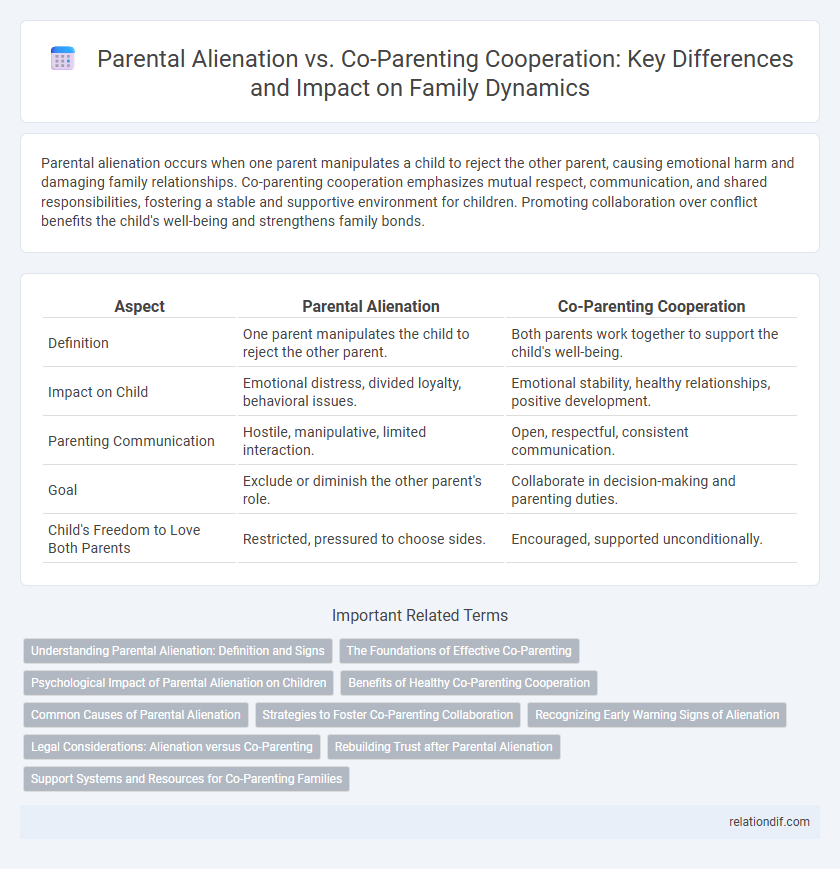Parental alienation occurs when one parent manipulates a child to reject the other parent, causing emotional harm and damaging family relationships. Co-parenting cooperation emphasizes mutual respect, communication, and shared responsibilities, fostering a stable and supportive environment for children. Promoting collaboration over conflict benefits the child's well-being and strengthens family bonds.
Table of Comparison
| Aspect | Parental Alienation | Co-Parenting Cooperation |
|---|---|---|
| Definition | One parent manipulates the child to reject the other parent. | Both parents work together to support the child's well-being. |
| Impact on Child | Emotional distress, divided loyalty, behavioral issues. | Emotional stability, healthy relationships, positive development. |
| Parenting Communication | Hostile, manipulative, limited interaction. | Open, respectful, consistent communication. |
| Goal | Exclude or diminish the other parent's role. | Collaborate in decision-making and parenting duties. |
| Child's Freedom to Love Both Parents | Restricted, pressured to choose sides. | Encouraged, supported unconditionally. |
Understanding Parental Alienation: Definition and Signs
Parental alienation occurs when one parent deliberately manipulates a child to reject the other parent, causing emotional estrangement and disrupted family bonds. Key signs include unjustified hostility towards one parent, a child's refusal to spend time with that parent, and the presence of negative or false accusations. Recognizing these behaviors early is crucial for promoting healthy co-parenting cooperation and safeguarding the child's emotional well-being.
The Foundations of Effective Co-Parenting
Effective co-parenting centers on consistent communication, mutual respect, and prioritizing the child's well-being above personal conflicts. Establishing clear boundaries and shared parenting goals minimizes the risk of parental alienation by fostering trust and collaboration between parents. This foundation supports a stable environment where children can thrive emotionally and developmentally despite parental separation.
Psychological Impact of Parental Alienation on Children
Parental alienation causes deep psychological distress in children, often leading to anxiety, depression, and impaired emotional development. This emotional turmoil contrasts sharply with co-parenting cooperation, which fosters a stable environment promoting healthy attachment and resilience. Children exposed to cooperative parenting experience better self-esteem and social relationships, highlighting the critical importance of minimizing parental alienation.
Benefits of Healthy Co-Parenting Cooperation
Healthy co-parenting cooperation fosters emotional stability and resilience in children by providing consistent support and nurturing from both parents. It reduces conflicts and stress, promoting effective communication and mutual respect, which contribute to the child's overall well-being and development. Collaborative parenting enhances decision-making regarding education, healthcare, and social activities, ensuring balanced guidance that aligns with the child's best interests.
Common Causes of Parental Alienation
Parental alienation commonly arises from high conflict divorce, unresolved custody disputes, and one parent's attempts to manipulate a child against the other parent. Emotional abuse, inconsistent parenting, and misinformation further fuel the child's rejection of the targeted parent. Recognizing these causes is essential for promoting healthier co-parenting cooperation and protecting the child's well-being.
Strategies to Foster Co-Parenting Collaboration
Effective strategies to foster co-parenting collaboration include open communication, establishing consistent routines, and prioritizing the child's emotional well-being. Implementing joint decision-making tools and utilizing mediation services help reduce conflicts and prevent parental alienation. Encouraging mutual respect and shared parenting responsibilities creates a supportive environment that benefits children's development.
Recognizing Early Warning Signs of Alienation
Early warning signs of parental alienation include a child's sudden hostility or rejection toward one parent without clear justification, frequent negative comments about that parent, and unexplained alignment with the other parent's views. Emotional withdrawal, resistance to spending time with one parent, and distorted perceptions of parental behavior often indicate alienation strategies. Identifying these patterns promptly supports effective co-parenting cooperation and protects children's emotional well-being.
Legal Considerations: Alienation versus Co-Parenting
Parental alienation involves one parent manipulating a child to reject the other parent, often leading to legal challenges focused on the child's best interests and custody rights. Courts prioritize co-parenting cooperation by encouraging shared parenting plans and communication to foster healthy child-parent relationships. Legal frameworks increasingly emphasize evidence-based assessments to distinguish alienation behaviors from genuine estrangement, promoting interventions that support collaborative co-parenting.
Rebuilding Trust after Parental Alienation
Rebuilding trust after parental alienation requires consistent communication and genuine efforts from both parents to prioritize the child's emotional well-being. Establishing clear boundaries and promoting positive interactions between the child and the alienated parent fosters healing and reduces resentment. Professional mediation and therapeutic support can play a crucial role in facilitating cooperation and restoring a healthy co-parenting relationship.
Support Systems and Resources for Co-Parenting Families
Support systems for co-parenting families include counseling services, mediation programs, and community support groups that promote effective communication and conflict resolution. Access to legal resources and parenting education workshops equips parents with tools to collaborate and prioritize their children's well-being. Strong social networks and professional guidance reduce the risks of parental alienation by fostering cooperative parenting environments.
Parental alienation vs Co-parenting cooperation Infographic

 relationdif.com
relationdif.com